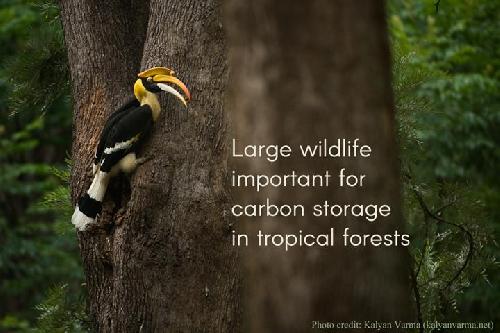Many tropical forest trees depend on large fruit-eating animals such as elephants, tapirs, monkeys and hornbills for dispersing their sizeable seeds. Declines of these large mammals and birds due to hunting and forest disturbance, and consequent declines of tree species that they disperse, constitute a global conservation problem. Now, an international consortium of researchers predicts that such losses can cause substantial changes in the potential for tropical forests across the globe to store carbon, and thereby alter their ability to regulate our world's climate.
Plants convert atmospheric carbon-dioxide to carbon stored in their living tissues through the process of photosynthesis. Trees in tropical forests form a large terrestrial 'carbon sink', which store carbon and play a crucial role in regulating atmospheric carbon-dioxide concentrations. However, when it comes to storing carbon, not all tree species are the same. In a recent study, reported in the journal Nature Communications, researchers find that large-seeded tree species which depend on big animals for seed dispersal, grow to greater sizes as adults and thus have higher carbon storage potential than species with smaller seeds in tropical forests worldwide. Losses of large seed dispersers can therefore reduce carbon storage by the Earth's tropical forests by decreasing the volume of vegetation biomass in these forests.
"Scientists are only just beginning to understand the numerous ways in which animals affect the carbon cycle of tropical forests, and the consequences of declines of these animals -- also termed 'defaunation' -- for terrestrial carbon storage ", says Anand M Osuri, a member of Mahesh Sankaran's group at NCBS and the study's lead author. "Although defaunation is a problem affecting tropical forests the world over, our understanding of its consequences for carbon storage relies heavily on patterns seen in one part of the tropics -- the forests of South America", he adds.
 Many tropical forest trees depend on large fruit-eating birds and animals such as hornbills and monkeys for dispersing their sizeable seeds. Credit: Photocredit: Kalyan Varma
Many tropical forest trees depend on large fruit-eating birds and animals such as hornbills and monkeys for dispersing their sizeable seeds. Credit: Photocredit: Kalyan Varma
The study predicts that the forests of the Americas, Africa and South Asia -- which are primarily composed of tree species dependant on animals for seed dispersal -- will face the most severe reductions of carbon storage due to declines of large seed dispersers. In contrast, carbon storage may be less sensitive to losses of large seed dispersers in the forests of Southeast Asia, where a number of large tree species depend on wind and gravity, rather than animals, for seed dispersal."Insights into these regional differences, which arise due to the unique evolutionary histories of trees in each region, are among the most interesting contributions of this study", says Jayashree Ratnam, one of the co-authors of this publication. "Even while tropical forests across the globe seem to look alike, they are functionally different -- and we are reminded once again that a one-size-fits-all model for a biome may often hide critically important differences in form and function", she adds.
Through extensive computer simulations, the study predicts that if 50% of all trees dispersed by large animals were replaced over time by trees with other modes of seed dispersal, carbon storage in tropical forests of the Americas, Africa and South Asia would be reduced by 2%. This is roughly equivalent to 14 years' worth of Amazonian deforestation.
Apart from these predictions, the study also highlights an urgent need for more research on understanding the complex dynamics of forests that have lost their animal inhabitants. "A number of factors contribute to determining which tree species will ultimately succeed in defaunated forests. Many of these factors are not understood very well at present", says Mahesh Sankaran. "Long term observations and experiments are essential to predict the exact magnitudes of, and time scales over which, community-level responses to defaunation may play out", he adds.
At present, policies such as REDD+ that are aimed at mitigating terrestrial carbon emissions primarily focus on reducing carbon losses by protecting tropical forests from deforestation and logging. This study shows that in addition to protecting the forests themselves, policies that give importance to conserving their fauna could also result in significant benefits for carbon storage in tropical forests.
source: National Centre for Biological Sciences